SRM University-AP receives oxygen concentrators from collaborator TEC-NTHU to fight the COVID-19 pandemic
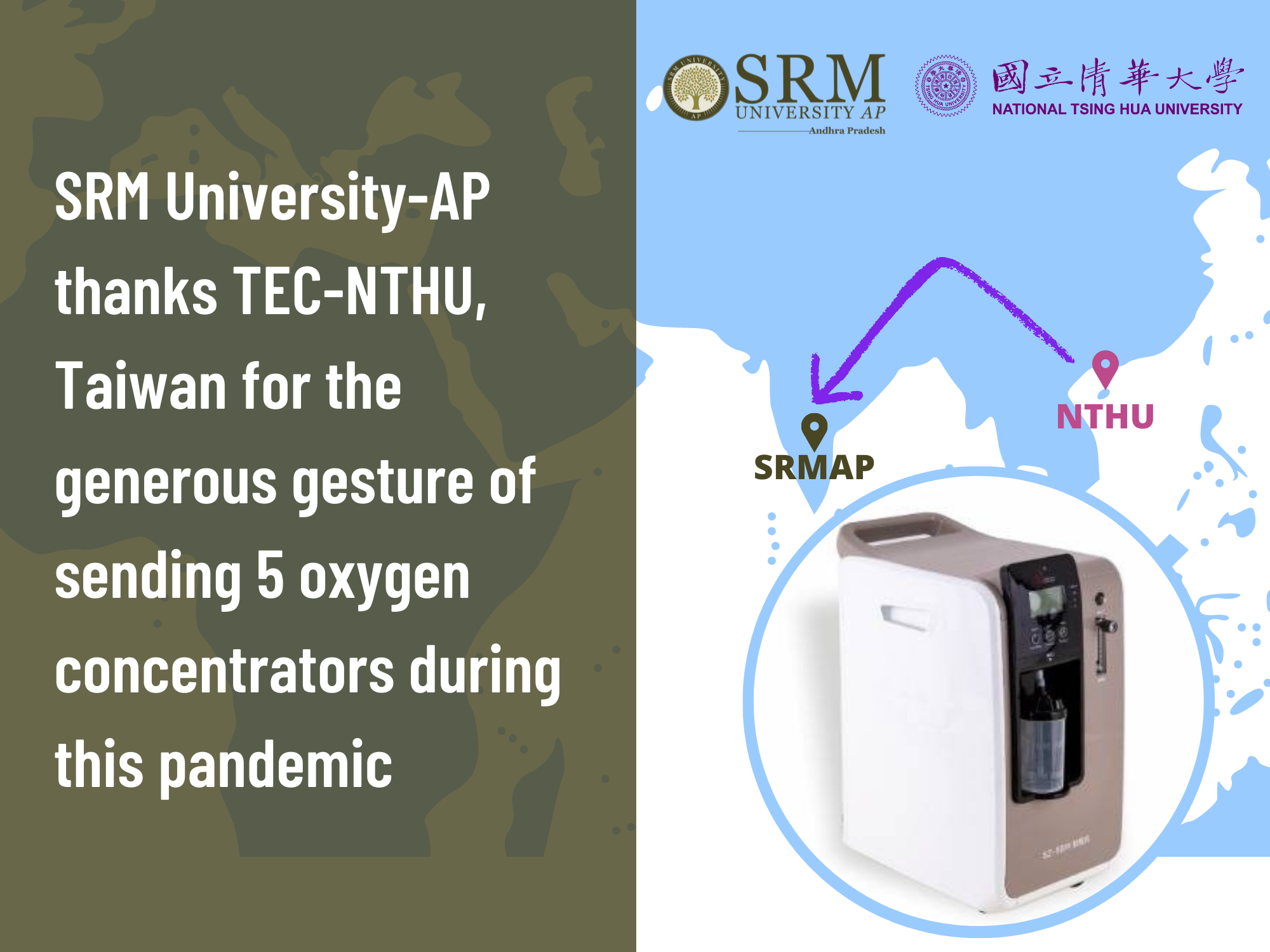 As the famous saying goes, “A friend in need is a friend indeed.” Bearing the signature of a true friend, Taiwan Education Centre – National Tsing Hua University (TEC-NTHU) has presented five oxygen concentrators to SRM University-AP, Andhra Pradesh. The powerful and lightweight oxygen concentrators can run around the clock with a maximum flow of 5 litres/minute. The Programme Office for Taiwan Education Center in India handed over the oxygen concentrators to the Medical Centre, SRM University-AP, on May 20, 2021.
As the famous saying goes, “A friend in need is a friend indeed.” Bearing the signature of a true friend, Taiwan Education Centre – National Tsing Hua University (TEC-NTHU) has presented five oxygen concentrators to SRM University-AP, Andhra Pradesh. The powerful and lightweight oxygen concentrators can run around the clock with a maximum flow of 5 litres/minute. The Programme Office for Taiwan Education Center in India handed over the oxygen concentrators to the Medical Centre, SRM University-AP, on May 20, 2021.
SRM University-AP has recently signed a Memorandum of Understanding with Taiwan Education Centre – National Tsing Hua University (TEC-NTHU) for bilateral exchange of knowledge and wisdom. TEC-NTHU is in the process of opening a TEC-SRMAP centre on the university campus to provide certificate courses on the Chinese (Mandarin) language. The centre will also assist the students towards the academic opportunities and scholarships available in Taiwan. An instructor in this regard has already been recruited by SRM University-AP.
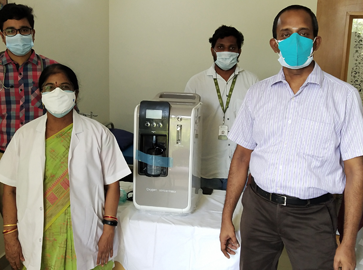 A well-populated country like India has been hit hard by the repeated waves of the COVID-19 pandemic. The crisis for oxygen and other medical supplies are very much evident throughout the nation. SRM University-AP, Andhra Pradesh, sincerely expresses gratitude towards Taiwan Education Centre – National Tsing Hua University (NTHU) for their kind gesture in the trying time.
A well-populated country like India has been hit hard by the repeated waves of the COVID-19 pandemic. The crisis for oxygen and other medical supplies are very much evident throughout the nation. SRM University-AP, Andhra Pradesh, sincerely expresses gratitude towards Taiwan Education Centre – National Tsing Hua University (NTHU) for their kind gesture in the trying time.
Dr V S Rao, the Vice-chancellor of SRM University – AP, thanked Prof. Wei-Chung Wang, Program Office Director for TEC-NTHU for their very generous support at this juncture. The oxygen concentrators are currently used by the faculty members and their families who require oxygen support due to COVID19 infection.
- Published in Collaborations, News
P Mohan Aditya granted copyright for biodegradable Face Shield design
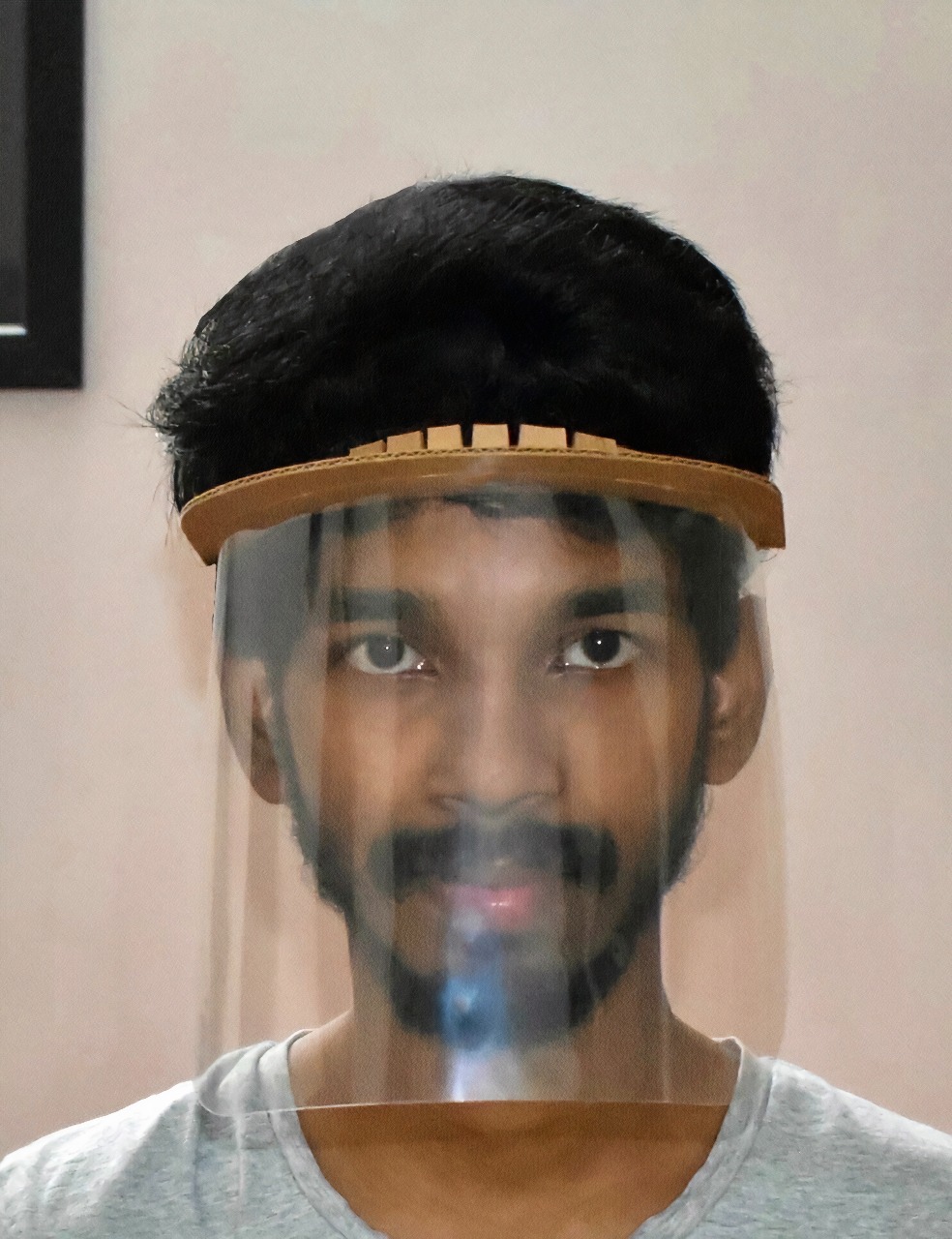 When the Covid-19 outbreak crippled the world, P Mohan Aditya, a 3rd-year Mechanical Engineering student from SRM University-AP, made an initiative of developing the highly useful face shield made from bio-degradable substances. He named it “Facial Shield 2.0”, as it was an improved version of the ordinary face shields. The innovative features added to it helped him to earn the copyright to his credit. On May 16, 2020, Aditya filed an application on the face shield design under the IPR (Intellectual Property Rights) with Indian Patent Office, located in Kolkata, India. In 2021, a copyright was granted for the” Face Shield for Humans” with a Design Application Number of 329364 – 001.
When the Covid-19 outbreak crippled the world, P Mohan Aditya, a 3rd-year Mechanical Engineering student from SRM University-AP, made an initiative of developing the highly useful face shield made from bio-degradable substances. He named it “Facial Shield 2.0”, as it was an improved version of the ordinary face shields. The innovative features added to it helped him to earn the copyright to his credit. On May 16, 2020, Aditya filed an application on the face shield design under the IPR (Intellectual Property Rights) with Indian Patent Office, located in Kolkata, India. In 2021, a copyright was granted for the” Face Shield for Humans” with a Design Application Number of 329364 – 001.
The face shield 2.0 serves as the outer defence to the mucous membranes (nose, eyes, and mouth) and comes with a transparent visor made of a thin layer of 175-micron reusable plastic and a highly durable headband made of 3-ply corrugated cardboard. The cardboard’s bursting strength is 16kg/sq.cm, which is quite durable yet lightweight. Due to the use of biodegradable materials, the price of a face shield is at an affordable cost of INR 15. The face shield 2.0, made with firm elastic, is adjustable and suitable for all head sizes for comfortable wear without hurting the head.
Shri Adimulapu Suresh, Hon’ble Minister of Education, Andhra Pradesh and Sri Nandigama Suresh, Hon’ble MP, appreciated the student’s efforts in the Secretariat’s premises. Aditya received high accolades from the guests present on his first successful invention. They also distributed face shields among state police officers, paramedics and other frontline workers deployed in the containment areas.
In a conversation with P Mohan Aditya, he says, “With an increasing environmental degradation, we should move to the eco-friendly alternatives to develop products/services. Therefore, I thought to develop face shields from reusable plastic and cardboard, which are easily degradable. After discovering a shortage in the supply of Personal Protective Equipment (PPE) globally, the idea struck my mind. Immediately I started researching on developing a piece of standard equipment to combat the Covid-19 pandemic. I am thankful to Mr Ravi, the attorney at SRM-AP, who supported me throughout the tough times by answering all doubts amidst challenging circumstances.”
 Aditya’s invention turned out to be a successful project both for the University and the public. The leadership team of SRM University-AP – Dr P Sathyanarayanan, President, Prof V S Rao, Vice-Chancellor, and Prof D Narayana Rao, Pro-Vice-Chancellor expressed their happiness on Aditya’s success by congratulating him on developing the face shield and making use of eco-friendly technology.
Aditya’s invention turned out to be a successful project both for the University and the public. The leadership team of SRM University-AP – Dr P Sathyanarayanan, President, Prof V S Rao, Vice-Chancellor, and Prof D Narayana Rao, Pro-Vice-Chancellor expressed their happiness on Aditya’s success by congratulating him on developing the face shield and making use of eco-friendly technology.
Using the CAD software, Aditya designed the transparent visor of the face shield and fabricated the remaining headband with the CNC machine. The CAD model was used as the input to the CNC machine, Following the design, the CNC machine analysed and cut the cardboard and transparent sheet accordingly.
P Mohan Aditya’s another innovative design on “building block for bed” was applied for a copyright on 09-08-2020. The building block for bed is again an innovative work of making beds using reusable materials for COVID 19 patients. He and his team also successfully created an electric bicycle using a 24V 250Watt DC motor powered by a 12V and 12Ah battery as a team assignment. Aditya desires to be a successful engineer and creator of such inventions for the betterment of society.
- Published in Mechanical Engineering NEWS, News, Research News, Students Achievements
Grad students developed society friendly apps, won Hackathons
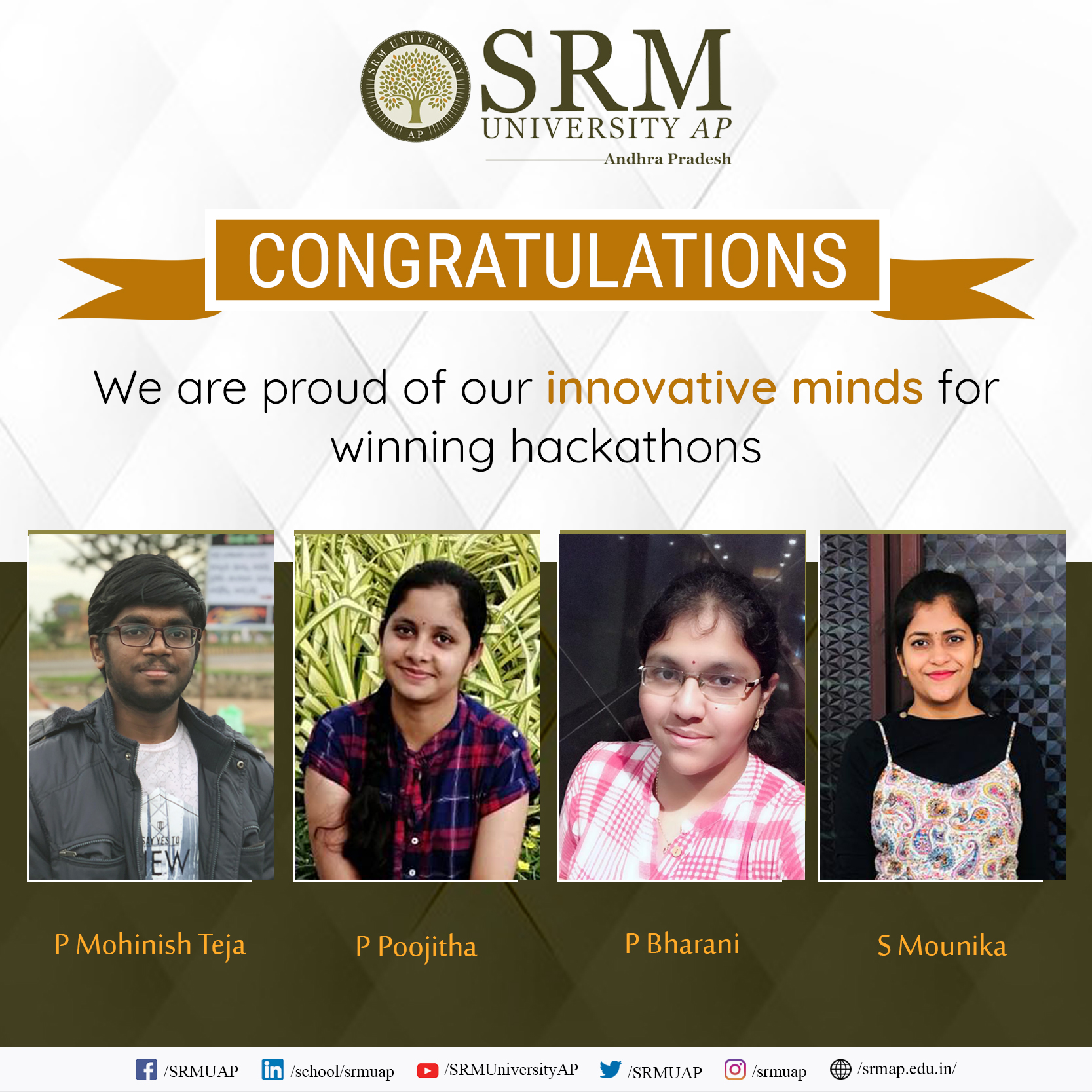 The SRM University-AP student, P Mohinish Teja from the Department of Computer Science and Engineering, brings laurel to the university by bagging the first prize at the Hackathon organised this year on April 16-18th by the Cal Hacks Team, University of California, Berkeley. More than 450 participants signed up for the world’s popular code-fest. Amongst these global participants, Mohinish won the title of “Best Hack” and a prize of $1000 worth of file coins from the sponsoring partner, Protocol Labs.
The SRM University-AP student, P Mohinish Teja from the Department of Computer Science and Engineering, brings laurel to the university by bagging the first prize at the Hackathon organised this year on April 16-18th by the Cal Hacks Team, University of California, Berkeley. More than 450 participants signed up for the world’s popular code-fest. Amongst these global participants, Mohinish won the title of “Best Hack” and a prize of $1000 worth of file coins from the sponsoring partner, Protocol Labs.
The idea of the application “Eco gift” is inspired by the Undergraduate Research Oriented Project under the guidance of Dr Ashok Kumar Pradhan, Assistant Professor-CSE and Mr Santosh Bhaskara, doctoral research scholar. Mohinish developed a Waste Management Decentralised Application called “Eco gift” using Blockchain Technology that rewards the users who categorically dump the waste. This application credits crypto tokens into the app users’ wallet. Even though it will not be the traditional currency, it can be used during registration, paying application fees, and payments at the government portals. The reward value increases with time, and the individual receives the token immediately after installing the application.
Mohinish led the team members P Poojitha, P Bharani, and S Mounika into another segment of Hackathon, Civhacks, organised by the Association of Students at the University of California, Berkeley, from April 23-25th where they bagged the “Best Civhacks” title.
The team developed a website application called “Anonymous Hawk” that displays the reported news by keeping the identity of the reporter anonymous for security reasons. The reporters facing life threats for reporting on the sensitive issue can sign up on the application. One can register simply by signing the transaction into the Blockchain. The data uploaded is stored in the Ethereum network and cannot be trifled by humans or software. The free flow of the information can take place by using the application without the fear of being targeted by any influential agents.
“Anonymous Hawk” brought each group member a prize of $500 file coins. The team was granted an opportunity to work further on the project by the sponsoring team, Protocol Labs. Mohinish expressed, “We are at the initial stage of the development of the high-end Decentralised App. In the next stage, we shall work on controlling the spamming of the information using the data and web-mining algorithms.”
- Published in CSE NEWS, News, Students Achievements
ECE Students admitted to prestigious universities across the globe
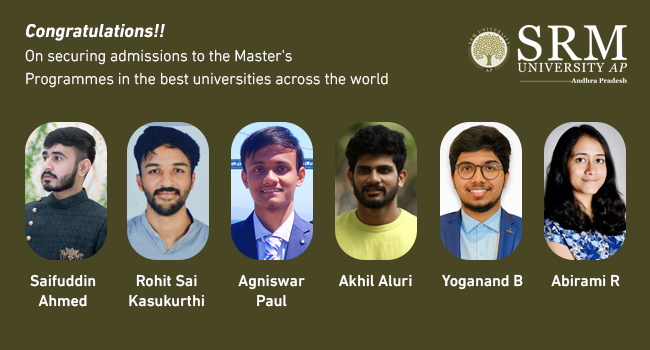 The Department of Electronics and Communication at SRM University-AP, Andhra Pradesh, is overjoyed to announce its students’ success in pursuing higher education. Six students from the maiden batch have performed brilliantly and been accepted to prestigious universities in the United States. These students are offered the opportunity to pursue a master’s degree in their chosen fields. Four of the six pupils have been accepted to New York University, and the remaining two are admitted to The University of Wisconsin-Madison and Georgia Institute of Technology in the United States of America.
The Department of Electronics and Communication at SRM University-AP, Andhra Pradesh, is overjoyed to announce its students’ success in pursuing higher education. Six students from the maiden batch have performed brilliantly and been accepted to prestigious universities in the United States. These students are offered the opportunity to pursue a master’s degree in their chosen fields. Four of the six pupils have been accepted to New York University, and the remaining two are admitted to The University of Wisconsin-Madison and Georgia Institute of Technology in the United States of America.
Saifuddin Ahmed, Akhil Aluri, Rohit Sai K, and Abirami Ravishankar have been awarded a handsome annual scholarship from New York University. The host university offered a grant of $10,000, $8000, $8000, and $11000, respectively. Among the four students, Saifuddin, Akhil, Rohit and Abirami, the first three opted for a master’s in Management of Technology and Abirami enrolled in the Department of Electrical Engineering. Agnishwar Paul is selected by Georgia Tech University while B Yogananda took admission in the Master’s-Research Programme at The University of Wisconsin-Madison. Yogananda has received an offer for Teaching Assistantship from University of Wisconsin, Madison and as a part of it, he will also be receiving a Monthly Stipend and full Tuition Fee Wavier.
Students indicated that the in-depth knowledge that they gained during their B. Tech studies made them very confident while applying for higher studies. Agniswar said, “The curriculum that is followed in the university is up-to-date and at par with reputed global universities. It helped me a lot to catch up with the expectations of my preferred university.” Saifuddin added, “I was a bit doubtful at first whether to pursue higher studies after graduation. But the sincere guidance of Dr Sunil Chinnadurai and Higher Connect Club invoked the hunger in me to seek more knowledge.”
Higher Connect Club (HCC) is the university’s dedicated wing to connect all ECE students interested in pursuing Higher Education after they graduate from SRM University – AP. This club is focused on clarifying all the doubts that usually arise in a student’s mind when pursuing higher education and provides required support with all the resources required, guiding in the best possible way.
“My professors helped me to come up with the right strategy to score well in GRE. All of our teachers have international exposures. It helped a lot during our preparations for higher studies,” said Yogananda. Apart from strong grades in undergraduate courses, selection rounds of interviews needed proficiency in work experience and extracurricular activities. “The experience we gained during the Semester Abroad Programme and Capstone Projects added value to the resume, which helped us tremendously to prove our merit,” asserted Abirami.
The Department of ECE is pleased with students’ accomplishments and encourages future batches to emulate them, bringing honour to SRM University-AP, Andhra Pradesh. Prof Siva Sankar Yellampalli, Head of the Department, said, “We are proud of our students. The first batch is about to graduate. We feel saddened to bid them goodbye, but at the same time, it makes me extremely happy to know that they are going to pursue their chosen paths. My best wishes are always with them.”
- Published in ECE NEWS, News, Students Achievements
“Commit to Quit”:SRM University-AP celebrates World No Tobacco Day
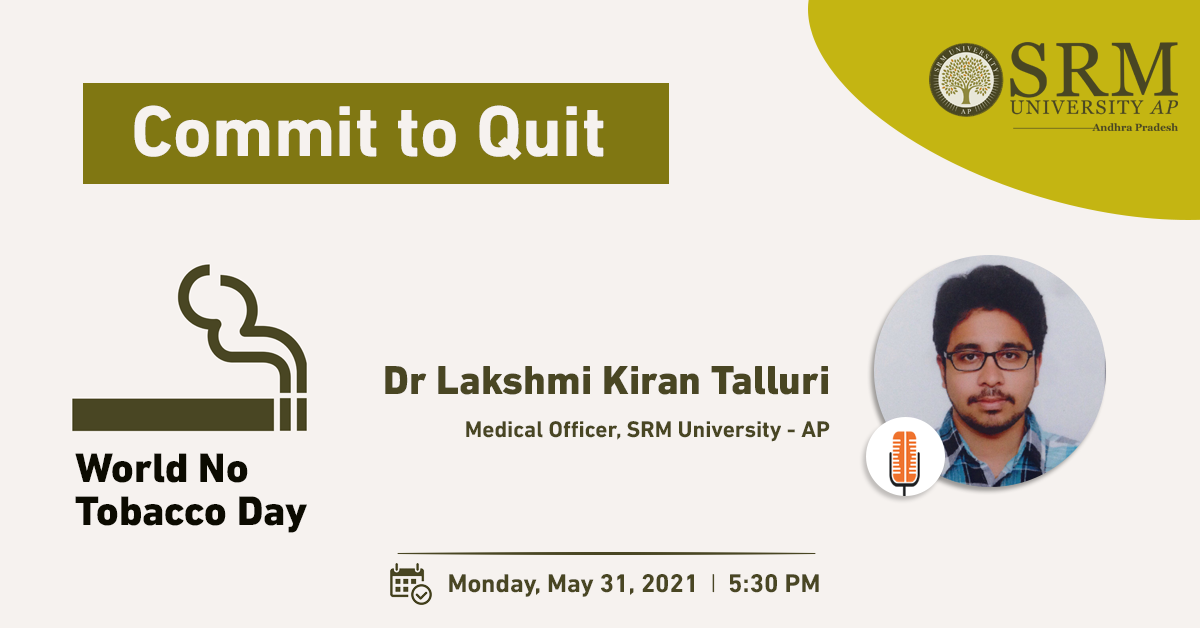 World No Tobacco Day is observed annually on May 31 by the World Health Organisation (WHO) and global partners to raise awareness on the dangers associated with tobacco usage. Following the theme of this year-“Commit to Quit”, SRM University-AP has organised a seminar to spread awareness and urge university students, teachers, and other employees to take a digital pledge to be restrained from using tobacco. The welcome Adress will be given by Dr Lakshmi Rajyam, Medical Officer, SRM University-AP. Dr Lakshmi Kiran Talluri, Medical Officer, will explain the downsides of tobacco usage as the keynote speaker. He will further guide the viewers with the challenges and strategies associated with quitting tobacco.
World No Tobacco Day is observed annually on May 31 by the World Health Organisation (WHO) and global partners to raise awareness on the dangers associated with tobacco usage. Following the theme of this year-“Commit to Quit”, SRM University-AP has organised a seminar to spread awareness and urge university students, teachers, and other employees to take a digital pledge to be restrained from using tobacco. The welcome Adress will be given by Dr Lakshmi Rajyam, Medical Officer, SRM University-AP. Dr Lakshmi Kiran Talluri, Medical Officer, will explain the downsides of tobacco usage as the keynote speaker. He will further guide the viewers with the challenges and strategies associated with quitting tobacco.
The programme emphasises the health hazards associated with tobacco use and encourages individuals to adhere to government rules aimed at reducing smoking and other tobacco product use. According to WHO reports, around 8 million people die each year because of tobacco use. In 1987, the WHO declared May 31 as World No Tobacco Day to encourage people to abstain from tobacco use for at least 24 hours. The World Health Organization even prohibited advertisements promoting any tobacco product in 2008. Cigarette users, according to research, are more susceptible to Covid-19 infection due to the compromised lungs and respiratory organs caused by heavy cigarette usage.
SRM University-AP commits to encouraging its associates to raise awareness and spread information about the hazards and realities of tobacco usage on World No Tobacco Day under the slogan “Commit to quit.” Dr Lakshmi Kiran Talluri holds the prestigious position of resident medical officer at SRM University-AP, Andhra Pradesh. He is an experienced medical expert and would provide significant insights to session attendees. Dr Talluri would speak from an expert perspective on the numerous aspects associated with smoking and tobacco intake to educate individuals about previously unknown facts. Therefore, everyone is urged to attend the knowledge-based session on May 31, 2021, at 5:30 p.m.
- Published in Events, Students Affairs Events, Webinars
100% placement in the first CSE batch of SRM University-AP with the highest offered salary of 50 LPA
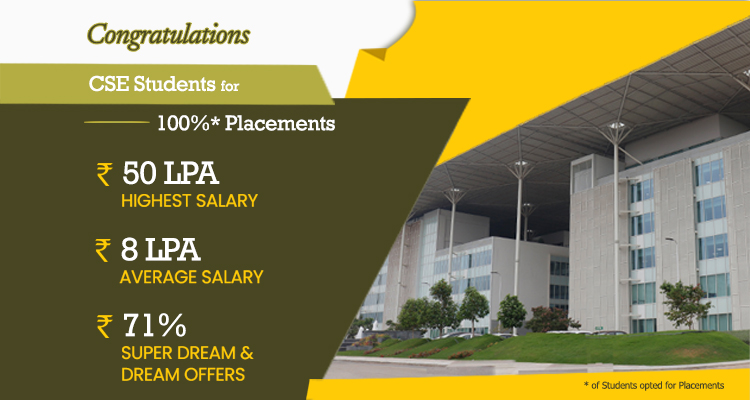 While the maiden batch of the nascent SRM University-AP is ready to set foot for the next venture, the Department of Computer Science and Engineering (CSE) proudly announces 100% successful placement for its students. The first-ever placement drive in SRM University-AP began last year amid the COVID-19 pandemic. However, overcoming all the difficulties, the talented engineers of the CSE department found their passion and a job offer according to their will. The brilliant students of CSE bagged envious offers with the highest salary of 50 LPA and an average salary of 8 LPA. 71% of the students are placed with Super Dream and Dream offers, which is highly commendable.
While the maiden batch of the nascent SRM University-AP is ready to set foot for the next venture, the Department of Computer Science and Engineering (CSE) proudly announces 100% successful placement for its students. The first-ever placement drive in SRM University-AP began last year amid the COVID-19 pandemic. However, overcoming all the difficulties, the talented engineers of the CSE department found their passion and a job offer according to their will. The brilliant students of CSE bagged envious offers with the highest salary of 50 LPA and an average salary of 8 LPA. 71% of the students are placed with Super Dream and Dream offers, which is highly commendable.
Amid the unprecedented crisis, the hiring process was a difficult task to be performed for both the students and the recruiters. Corporate Relations and Career Services (CR&CS), the placement team of the university, has done an excellent job by conducting the placement drive with passion and dedication. The students were provided with every support they needed during these trying times. During their internships and projects in reputed companies, the students had hands-on experience, industry exposure, and became aware of the expectations of the corporate world. This experience helped the students to prepare for the job interviews. The numerous training sessions arranged by the CR&CS team for core and soft skill development brushed up their knowledge and personality. The mock interviews, sessions with corporate experts also assisted the students in their preparation. The interdisciplinary modernised curriculum provided the students with in-depth knowledge in their domain, strengthening their basic skills.
“Every moment at SRM-AP was so defining. Academics and research, 24×7 student-run Next Tech Lab, Semester Abroad and Entrepreneurship at UC Berkeley, USA and winning Hackathon in Bay area competing with MIT, Stanford and Carnegie Mellon gave us the wide exposure of the real world, which would not have been possible without the continuous support of our faculty and university management. Now, it is time that we start our life in Japan, and we are very much looking forward to the new chapter,” said Rajarshi Mazumder, who has received the highest offer of this season with a pay package of 50 LPA along with his twin Saptarshi. Sri Ritika Katragadda, who has been offered one of the best packages with 29.5 LPA, opined, “The selection process was tough, but with the extensive knowledge we gained in the classroom studies, I cleared it with ease.”
“The support I received from my professors and CR&CS team is unforgettable. I am forever grateful to their guidance, for being able to secure such a good offer,” said Sai Krishna Rohith, who bagged an offer of 20 LPA. “Prof Ragunathan is like a father figure to me. I can reach him anytime without any hesitation, even in case of a smallest doubt. All other faculty members were equally supportive,” asserted Venkata Sai Nikhith Nagamlla. Venkata also received an offer of 29.5 LPA.
Mr Vivekanandan, Assistant Director, Corporate Relations and Career Services, said, “We always looked for the best opportunities for our students. The talent exhibited by the CSE students during the internships, projects, curriculum and extra-curriculum activities naturally drew the best recruiters to SRM University-AP.”
“SRM University-AP has made its name as a reputed tech hub to the recruiters who are searching for the best engineers to recruit. We are certain that in the coming years, the numbers of top offers will further increase, creating a record in the country,” shared Professor Ragunathan, Associate Dean in the School of Engineering and Basic Sciences and Head of the Department of Computer Science and Engineering.
“SRM University-AP is founded with the vision to offer quality engineers, entrepreneurs and professionals to the country. In the First Placement Drive itself, the university has proved its mettle and has become a favourable destination for top recruiters,” said Prof V S Rao, Vice-Chancellor, SRM University-AP.
- Published in CR&CS NEWS, CSE NEWS, News, Students Achievements
Prof Puru Jena enlightens on “Beyond the Periodic Table of Elements”
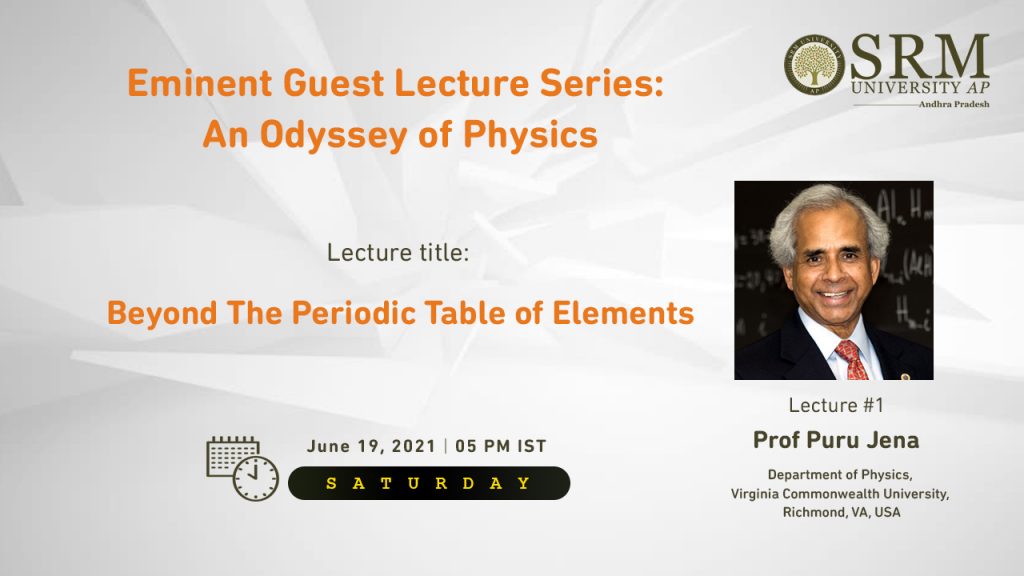 The Department of Physics, SRM University-AP, Andhra Pradesh, organizes a continual online and offline Lecture Series entitled “Eminent Guest Lecture Series: An Odyssey of Physics” to understand the recent advances and future developments in the field of Physics and allied sciences. The first seminar of this lecture series, on the theme Beyond the Periodic Table of Elements is scheduled to be held on June 19, 2021 at 5.00 pm (IST). Prof Puru Jena, distinguished Professor of Physics at Virginia Commonwealth University, USA will enlighten and engage the session with his extensive knowledge and expertise in the domain.
The Department of Physics, SRM University-AP, Andhra Pradesh, organizes a continual online and offline Lecture Series entitled “Eminent Guest Lecture Series: An Odyssey of Physics” to understand the recent advances and future developments in the field of Physics and allied sciences. The first seminar of this lecture series, on the theme Beyond the Periodic Table of Elements is scheduled to be held on June 19, 2021 at 5.00 pm (IST). Prof Puru Jena, distinguished Professor of Physics at Virginia Commonwealth University, USA will enlighten and engage the session with his extensive knowledge and expertise in the domain.
Abstract: The periodic table created by Mendeleev in 1869 is the mother of all materials. The realization that the physics and chemistry of materials at the nanoscale can be very different from their bulk and that their properties in small clusters can be tailored one atom at a time led to the hypothesis, more than twenty years ago, that stable atomic clusters with specific size and composition and mimicking the chemistry of atoms can be designed and synthesized. These clusters, known as superatoms, can form the building blocks of a new three-dimensional periodic table as well as a new class of cluster-assembled materials. In this talk, Dr Puru Jena will outline the considerable progress that has been made over the years by focusing on superalkalis and superhalogens, which mimic the chemistry of alkalis and halogens, respectively and can be used to form supersalts with uncommon properties. The ionization energies of superalkalis are less than those of alkali atoms while the electron affinities of superhaloegns are larger than those of halogen atoms. He will present examples where these superions are used to promote unusual chemistry making noble gas atoms form chemical bonds at room temperature, superhalogens forming halogen-free electrolytes in Li-ion batteries, superalkalis as building blocks of new electrides where the electron is completely detached from the host and remain localized pretending to be an anion without a nucleus, superhalogens as building blocks of multiferroic materials, and supersalts capable of enhancing the Curie temperature of 2D materials. The synergy between first principles theory and experiments in advancing our understanding of matter at the nanoscale will be highlighted.
About the Speaker: Dr Puru Jena is a Distinguished Professor of Physics at Virginia Commonwealth University and received his Ph. D. in Physics from the University of California at Riverside. He also served as Program Director at the National Science Foundation and as Jefferson Science Fellow and Senior Science Advisor at the US Department of State. Dr Jena’s research covers a wide range of topics in Nano-structured Materials, Condensed Matter Physics, and Materials Science. These include structure and properties of metals, semiconductors, superconductors, alloys, liquid metals, point and complex defects, surfaces, thin films, atomic clusters, and cluster assembled materials. His current research is focused on three major areas: Structure and properties of nano-clusters and cluster assembled materials (0 D), nanotubes and nanowires (1D) and mono- and multi layered materials (2D) with emphasis on energy storage; electronic, magnetic, and optical properties. Dr Jena is the author of nearly 630 papers including 14 edited books with Google citations and H index at 31,300 and 88, respectively. He has given over 425 invited talks in international conferences and academic institutions in 29 countries around the world and has organized 50 international conferences. He has received over $15 million dollars of funding from federal agencies such as the Department of Energy, Department of Defense, National Science Foundation, and NASA. His many honours include being the Fellow of the American Physical Society; Outstanding Scientist of Virginia; Outstanding Faculty of Virginia; Presidential Medallion, University Award of Excellence, and Outstanding Scholar from Virginia Commonwealth University. He has served as a member of numerous scientific panels including on the Presidential Commission on bilateral scientific collaboration between USA and Russia.
We welcome you to actively participate in this scholarly lecture series on 19 June 2021 at 5.00 pm (IST). For more details and registration, kindly visit the links given below:
Registration Link: https://srmap.zoom.us/webinar/register/WN_MV36TDJ1Tw6MuuG7ep8BcA
Know more about Prof Jena: https://physics.vcu.edu/jenasgroup/
Spatial dimensions of Big Data jobs for efficient cluster job scheduling
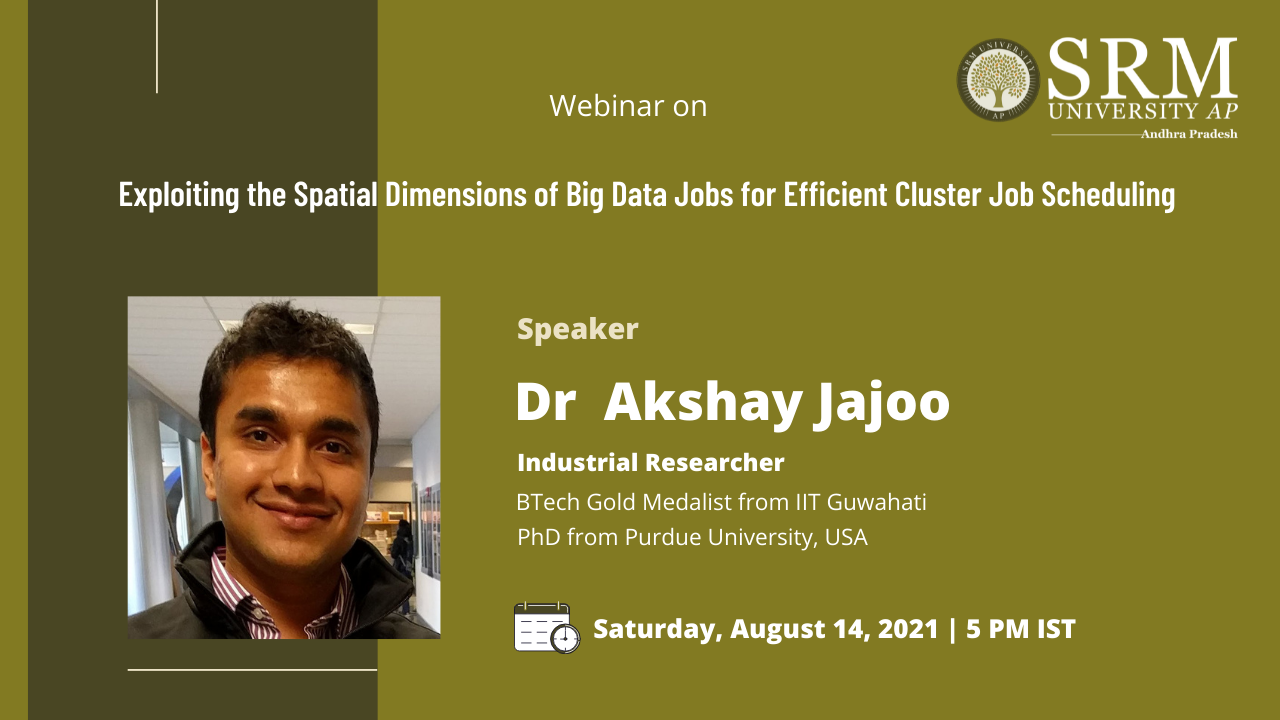 The Departments of Electrical and Electronics Engineering (EEE) and Computer Science and Engineering (CSE) jointly present a technical talk on “Exploiting the Spatial Dimensions of Big Data Jobs for Efficient Cluster Job Scheduling” on August 14, 2021, Saturday, at 5:00 pm (IST). Dr Akshay Jajoo, industrial researcher, will enlighten the students and researchers on his PhD thesis which focuses on developing novel learning and scheduling algorithms for distributed jobs in clouds.
The Departments of Electrical and Electronics Engineering (EEE) and Computer Science and Engineering (CSE) jointly present a technical talk on “Exploiting the Spatial Dimensions of Big Data Jobs for Efficient Cluster Job Scheduling” on August 14, 2021, Saturday, at 5:00 pm (IST). Dr Akshay Jajoo, industrial researcher, will enlighten the students and researchers on his PhD thesis which focuses on developing novel learning and scheduling algorithms for distributed jobs in clouds.
The session, coordinated by Dr Tousif Khan N, Head of the Department of Electrical and Electronics Engineering, will cover the details of the concepts, use cases, and involved technology overview. Avid researchers and prospective industrialists are welcome to join the event.
About the Speaker:
Dr Jajoo earned his doctoral degree in computer science from the esteemed Purdue University, USA. His thesis proposes, validates, and designs systems that employ learning algorithms exploiting spatial dimensions. His research focussed on the use of spatial dimensions for efficient scheduling of distributed jobs and to speed up Coflows and big data jobs. While doing B. Tech at IIT Guwahati, he was awarded Gold Medal for academic achievement, extracurricular activities, and community service. On account of his outstanding academic record, Dr Jajoo was granted different scholarships to pursue research in France and Germany. He has also been a member of ISSA, ACM, and CERIAS.
Link to Abstract: https://www.cs.purdue.edu/homes/ajajoo/finals/akshay_jajoo_phd_thesis_abstract.pdf
Registration Link: https://srmap.zoom.us/webinar/register/WN_tT6KBsWUSqG1TakZLD419g
3rd Year EEE Student Selected for Prestigious “INAE – Engineering Student Mentoring Programme”
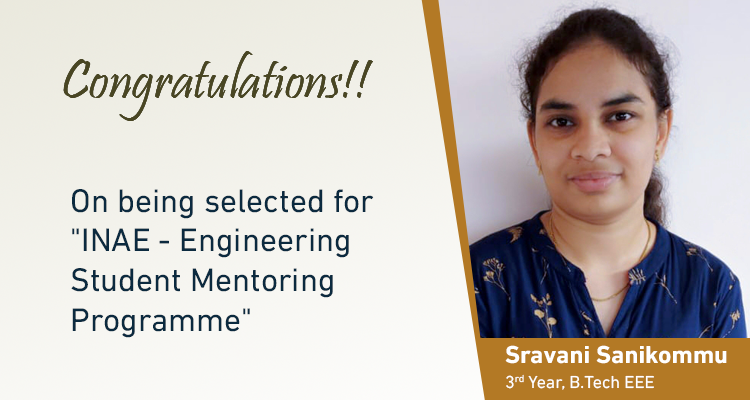 Ms Sravani Sanikommu, a vibrant and keen third-year Electrical and Electronics Engineering (EEE) student from SRM University-AP, has been selected for the prestigious Mentoring of Engineering Students by INAE Fellows Programme by the Governing Council of Indian National Academy of Engineering (INAE). She is one amongst 59 brilliant students who have been selected from across the country this year. The objective of this distinguished programme is to mentor outstanding B.E/BTech undergraduates by INAE fellows. Meritorious 3rd /4th year B.E./B. Tech students from recognised Engineering institutions are eligible under the scheme. Candidates must have a minimum of 75% or a CGPA of 7.5 to be considered for this programme. The mentorship program takes place through an online medium.
Ms Sravani Sanikommu, a vibrant and keen third-year Electrical and Electronics Engineering (EEE) student from SRM University-AP, has been selected for the prestigious Mentoring of Engineering Students by INAE Fellows Programme by the Governing Council of Indian National Academy of Engineering (INAE). She is one amongst 59 brilliant students who have been selected from across the country this year. The objective of this distinguished programme is to mentor outstanding B.E/BTech undergraduates by INAE fellows. Meritorious 3rd /4th year B.E./B. Tech students from recognised Engineering institutions are eligible under the scheme. Candidates must have a minimum of 75% or a CGPA of 7.5 to be considered for this programme. The mentorship program takes place through an online medium.
The Governing Council of the Indian National Academy of Engineers (INAE) designed the mentoring programme to encourage future engineers in the nation to make significant contributions to engineering and technology for holistic solutions. Due to COVID-19 pandemic, online internship is also available. Ms Sravani gets an opportunity to work online in the host institution in the field of power electronics under the able mentorship of INAE Fellow Prof B G Fernandes, Electrical Engineering, Indian Institute of Technology Bombay (https://www.ee.iitb.ac.in/wiki/faculty/bgf) for 2 Months. She extended her gratitude to Dr Tousif Khan N, the Head of the Department, and Prof Sastry V Vedula, a distinguished visiting professor in the Department of Electrical and Electronics Engineering, as well as an INAE fellow, for initiating her into the mentoring programme and providing constant guidance.
Sravani stated that she had complete supervision of faculty members of SRM-AP during the preparation for this two month Mentoring Programme. The extensive research expertise of faculty members aided significantly throughout the selection process among the finest applicants. “I thank everybody who has put efforts into making this happen. SRMAP can provide such amazing opportunities to research in the fields in which students are interested in working. This is made possible through the faculty members who are experienced in the specified fields which helps the students to learn more about the subject and form a substantial idea on how the concepts work. If somebody is keenly interested in research on something they love and are very passionate about it, SRMAP is the right place!!”, said Ms Sravani with overwhelming enthusiasm.
- Published in EEE NEWS, News, Students Achievements
Renowned physicists deliver talks at the “One-Day National Symposium on High Energy Physics.”
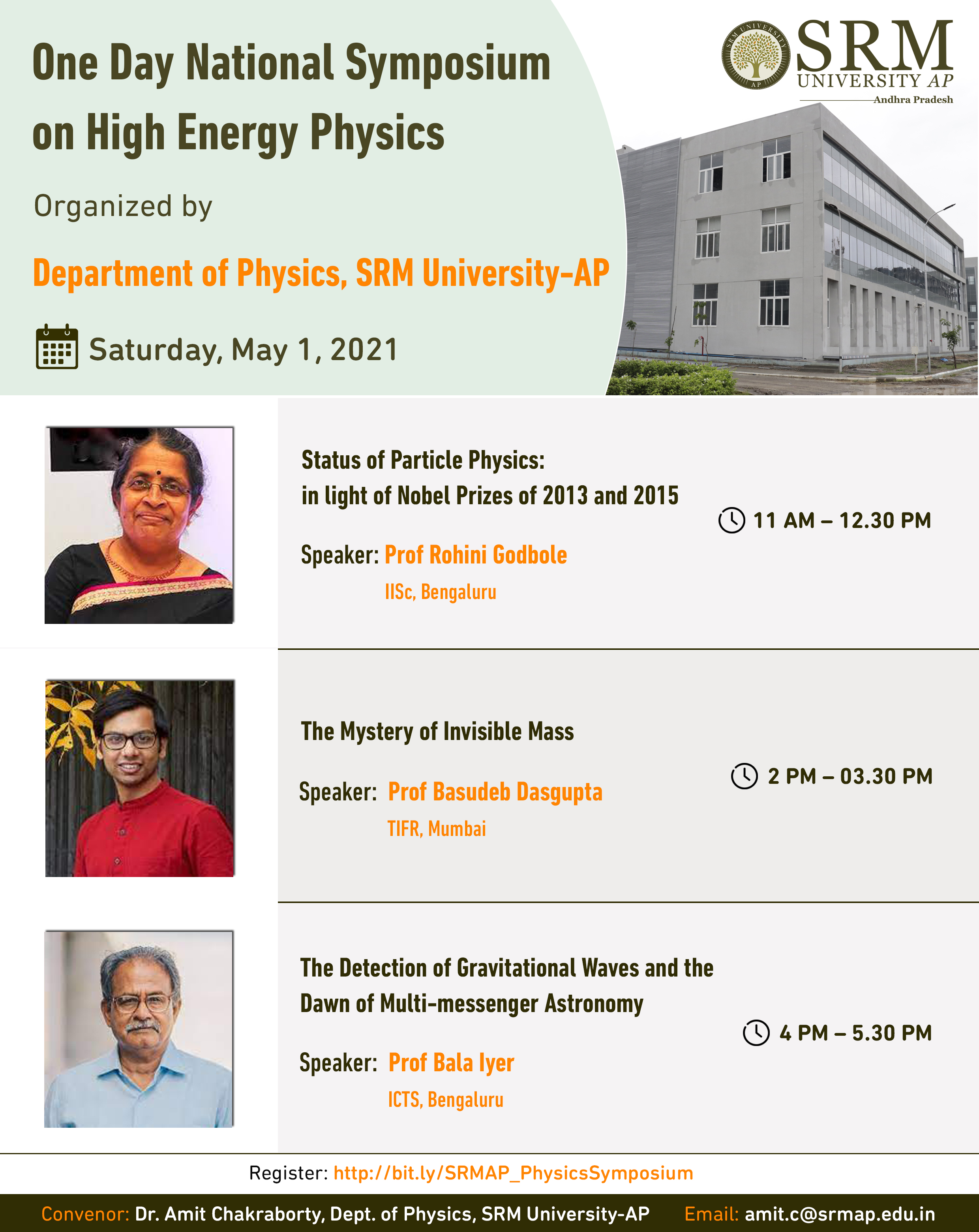 The Department of Physics, SRM University-AP organized a “One-day National Symposium on High Energy Physics” on Saturday, May 1, 2021. The session was held through online mode in the presence of honourable leaders of the university, faculty members, and attendees from various fields of interest. Prof V S Rao, the Vice-Chancellor, SRM University-AP, welcomed the gathering with a brief overview of the university’s inception and quick progress in the field of research.
The Department of Physics, SRM University-AP organized a “One-day National Symposium on High Energy Physics” on Saturday, May 1, 2021. The session was held through online mode in the presence of honourable leaders of the university, faculty members, and attendees from various fields of interest. Prof V S Rao, the Vice-Chancellor, SRM University-AP, welcomed the gathering with a brief overview of the university’s inception and quick progress in the field of research.
Three talks at the pedagogical level were organised for a wider audience, especially for the students of basic sciences and engineering streams. The first speaker, a Padma Shri awardee, Prof Rohini Godbole, who is a theoretical particle physicist at Indian Institute of Science (IISc), Bengaluru expounded on “Status of Particle Physics: in light of Nobel Prizes of 2013 and 2015”. She talked about the Higgs Boson’s theoretical postulate, for which the Nobel Prize in Physics was granted in 2013. According to studies, it was the final missing element in the Standard Model’s periodic table (SM). Her paper incorporated the experimental finding of the Neutrino Oscillation, as well as many compelling pieces of evidence that led to the 2015 Nobel Prize.
In the afternoon session, the talks were on the burgeoning field of Dark Matter physics and Gravitational-wave astronomy. Prof Basudeb Dasgupta from Tata Institute of Fundamental Research (TIFR), Mumbai apprised the participants on “The Mystery of Invisible Mass”. The deep understanding and expertise of Prof Dasgupta in the interfaces of particle physics, astrophysics, and cosmology with a particular emphasis on dark matter and neutrino physics as a theoretical physicist at the Tata Institue of Fundamental Research (TIFR) enlightened the audience. He stated that the human beings are able to see only 20% of the universe’s celestial objects; the remaining 80% are unseen and are referred to as “dark matter.” In his words, “Billions of years after the Big Bang, all we can see is the cloud’s surface, where the light is scattered.” Prof Basudeb, is a frequent speaker at prestigious international and national conferences and is a youth icon for aspiring physicists and scientists.
The final lecture of the day was delivered by Prof Bala Iyer from International Centre for Theoretical Sciences (ICTS), Bengaluru on “The Detection of Gravitational Waves and the Dawn of Multi-messenger Astronomy” at 4.00 pm. Prof Iyer is currently the Simons Visiting Professor at ICTS-TIFR Bangalore and co-PI of the LIGO-India Scientific Collaboration. He coaches and guides young minds interested in astrophysics, cosmology, and fundamental physics. Prof Iyer did a presentation on the discovery of gravitational waves from a binary black hole in 2015, which was a watershed moment and necessitated the launch of a new multi-messenger astronomy with the potential to have a significant impact on astrophysics. “Any relativistic theory of gravity must be consistent with the special relativity principle. Gravity’s effect cannot travel faster than the speed of light. If an item’s gravitational field changes, the changes propagate over space and take a certain amount of time to reach the object “, he added.
The symposium that aimed to discuss the current status of exciting research topics of High Energy Physics concluded with a Q&A session. This has proved that the faculty members and participants were highly inspired and motivated after attending the symposium and listening to the scholars.
Pre-Event Release: https://srmap.edu.in/events/national-symposium-on-high-energy-physics-2021/
- Published in News, Physics News

